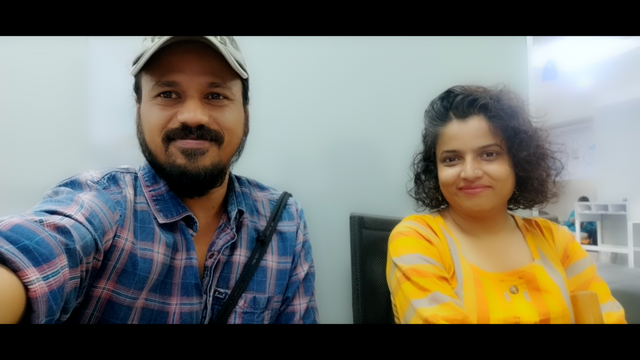It's been exactly a week since we visited the doctor. Last time, we had a fairly basic, generalized overview about anxiety. There were a few more points we wanted to discuss this time. As usual, we got ready and were waiting. Our tea ritual was done, but this time my wife was somewhat relaxed, thanks to the previous session with Dr. Kureshi
Then we headed out immediately and went straight to the waiting room. There wasn’t much crowd, and since we had already taken an appointment, it wasn’t a problem. When we got in, the doctor greeted us with a smile and asked how we were doing. My wife said she was feeling much better now. Then he reviewed what we had discussed last time and began the session.

He: We talked about individual physiological responses, and also, there are other situational factors that are responsible. Their role in this process should also be understood.
He pulled a writing pad closer, took a pen from the pen stand, and began explaining. We leaned forward with the curiosity of children, ready to learn something new.
He: See, the first fundamental thing, which we can call the bottom of the pyramid, is genes. Often this is genetic, which means it could have come from your previous generations. But it's not all dependent on this, and it's not the only factor. This is one of the factors.
I took a sip of water and got absorbed in looking at the pyramid again.
He: The second factor is your neural network, which is formed when your brain is being developed at birth. This neural network plays an important role in your anxiety response. For example, if your mother was stressed when you were in the womb, the cortisol hormone crosses from her body to the foetus through the placenta and becomes part of the physiological and subsequently the psychological neural network.
We had never thought that this event could be so impactful at the time of birth, but it was interesting and fascinating how things are interconnected.
He: Now, the third layer/factor in the pyramid is your cognitive schema. This means the ways or methods of responding to things in the house where you grow up. Your cognitive schema is formed according to those methods. For example, if something happens and someone in the house always says 'Oh my God,' the child growing up in that environment will have a similar reaction and behavior.
We looked at each other, and I hinted with a smile, suggesting that this was where it came from. The doctor didn't notice.
Me: Oh, her mother has a bit of that kind of nature, so perhaps...
He: Oh... that could be. But remember, this is also one of the factors, not 'the factor.'
So, let's move on. The fourth factor here is society! Now society means others apart from your family. This includes friends, relatives, close and known people. Your responses are also shaped by how these people view certain things. We can also call this the socio-cultural impact.
Listening to this, it was thought-provoking to realize that it's not just us and our family but society that plays a role too.
He: Now, the fifth and final factor, as it is at the top, is its nature. This is called the biosphere. In short, the environment. For example, people living in equatorial countries have a different response due to the constant hot climate compared to those living in the cold regions of the South and North Poles. This is the impact of the environment!
She started laughing. When I asked why, she said, "When you come home from the office, you start getting irritated, then I turn on the AC, and as the temperature decreases, you gradually calm down." I had never noticed this before.
He: See, this is the difference that the environment makes. So, our anxiety trigger response is formed by a combination of all these five factors, not just one.

We were now having a 'wow' moment! The connection between simple anxiety and all these factors was eye-opening.
He: That's all for now; we'll continue in the next session. Until then, think about it and take care.
With this revelation, we thanked him, left the clinic, and went straight to the coffee shop. We discussed the session over sips of coffee and happily headed home, looking forward to the next session.
just remembered a line: every dark cloud has a silver lining...

(In summery, this happened in our 2nd session, will update about next one)
Thanks
Thanks for sharing such awesome content
@djvijay!
It has been featured in
THIS BLOG SPOTLIGHT POST!
You will receive 10% of the rewards
earned on that curation post.
We have also given you an upvote and a resteem!
An initiative by @jaynie
Please feel free to show your support to this initiative as well as to the authors featured within!
HAVE AN AMAZING DAY!
Downvoting a post can decrease pending rewards and make it less visible. Common reasons:
Submit
Thank you so much @steemitbloggers!
It's been an honour. :)
This is moral boosting to create a quality content.
Thanks.
Downvoting a post can decrease pending rewards and make it less visible. Common reasons:
Submit
It certainly is @djvijay :) It feels just as good to acknowledge it! :) Hope you have a wonderful week ahead! xxx
Downvoting a post can decrease pending rewards and make it less visible. Common reasons:
Submit
Your post has been supported by THE QUEST TEAM. We support quality posts, good comments anywhere, and any tags
Downvoting a post can decrease pending rewards and make it less visible. Common reasons:
Submit
Thank you, friend!


I'm @steem.history, who is steem witness.
Thank you for witnessvoting for me.
please click it!
(Go to https://steemit.com/~witnesses and type fbslo at the bottom of the page)
The weight is reduced because of the lack of Voting Power. If you vote for me as a witness, you can get my little vote.
Downvoting a post can decrease pending rewards and make it less visible. Common reasons:
Submit
Upvoted! Thank you for supporting witness @jswit.
Downvoting a post can decrease pending rewards and make it less visible. Common reasons:
Submit